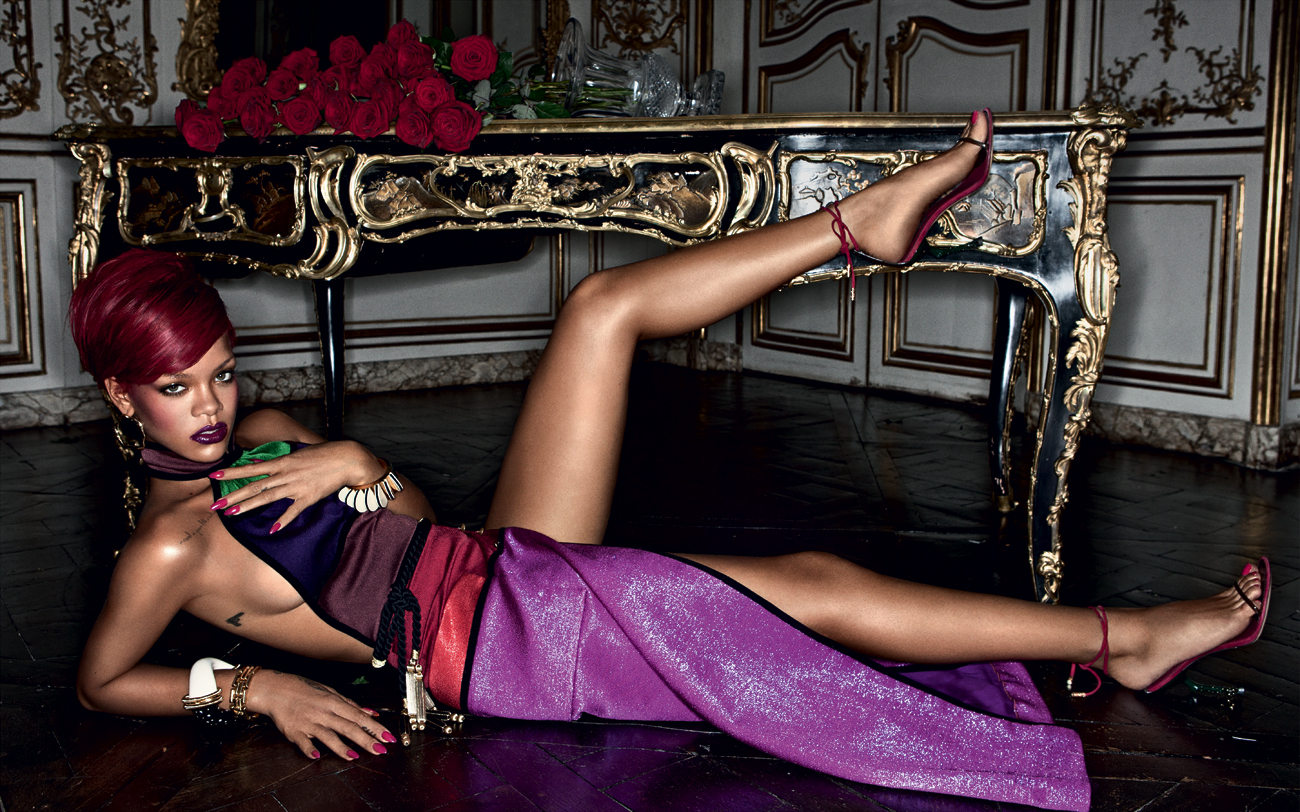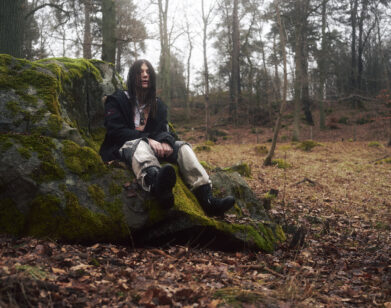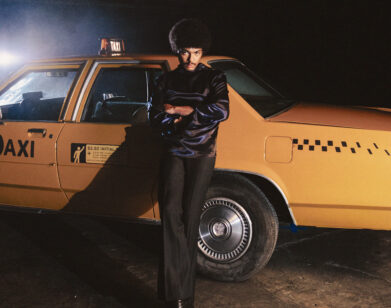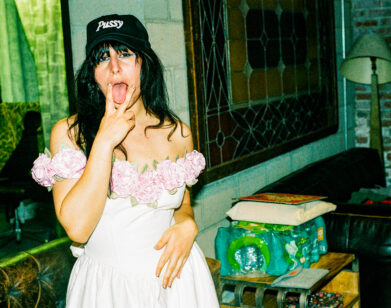Rihanna
I think a lot of people have a misperception of me. They only see the tough, defensive, aggressive side. But every woman is vulnerable. So of course I am going to have that side. . . . I just don’t like people to see me cry.Rihanna
Making sense of Robyn Rihanna Fenty’s evolution-or more accurately, morphing-from the 17-year-old former Barbadian beauty queen who emerged five years ago equipped with a handful of Caribbean-flavored pop songs, an elaborate system of Real Housewives hair, and a million-watt smile, into the asymmetrically-tressed, tattooed, futuristic pop hellion that she is today, is a complex undertaking. She has produced four wildly successful, increasingly adventurous albums-Music of the Sun (2005), A Girl Like Me (2006), Good Girl Gone Bad (2007), Rated R (2009)-as well as her latest, Loud (Def Jam), which, if the success of the first single, “Only Girl (in the World),” is any indication, appears on course to maintain the trajectory. As a result, she has emerged as a bona fide pop phenomenon: a performer audacious enough to sing on stage while splayed across a hot pink tank; a self-possessed woman who deftly brandishes her sexuality like a rapier; and a swaggering album-to-album changeling who reliably cranks out hit after hit touched by whatever happens to be the latest or greatest innovation in hip-hop and dance music songcraft in a given moment. And like most 22-year-old, 21st-century pop stars, she’s a polyglot, striving to make the Rihanna Proposition a diversified one by venturing into other areas like fashion and film (Rihanna is set to make her acting debut in Peter Berg’s forthcoming action epic Battleship, which is, somewhat quizzically, based on the board game.). But, unfortunately, Rihanna has also become an icon of a different sort. This second aspect of the Rihanna Proposition stems almost entirely from the events of February 8, 2009, when she was forced to cancel a scheduled appearance at the Grammys after she was assaulted during an apparent argument with her then-boyfriend, singer Chris Brown. Photos of Rihanna with what appeared to be cuts and bruises on her face leaked online shortly thereafter, those images-graphic, violent, disturbing, and, sadly, real-are not the kind that anyone forgets too quickly.
Ever since the Brown incident, it has been difficult to discuss Rihanna, the pop star, without recalling Rihanna, the victim of domestic violence. But one of the great strengths of the Rihanna Proposition is its unrelenting forward momentum. Just as she has flitted from sound to sound and look to look from album to album, picking up and dropping trends, ideas, and tropes with an almost robotic efficiency, Rihanna, at least musically, isn’t a dweller. Listening to Rated R or Loud, one doesn’t experience the sensation of being submerged in a thick pool of rise-above moments. There is very little gut-wrenching, out-lashing, or hand-wringing. There are no gurus name-checked or healing trips to India detailed. What there is is a visceral physicality, an R&B fierceness, a clubby infectiousness, and the ever-changing, vividly Technicolor coat of creative armor worn by a woman who has a very clear idea of what she’s going to give you in the context of her work as a performer and what she’s going to keep for herself-which, in a culture where the ongoing soap opera of celebrity life has become inextricably bound up with the idea of entertainment, the airing out of personal trauma has become a career move, and confession has become a meme, represents an almost quaint throwback of a concept. Kanye West, Rihanna’s longtime consort and collaborator, caught up with the singer in New York City as she prepared to promote the release of Loud with a performance on Saturday Night Live, where she showcased her latest look, having jettisoned the Grace Jones-manqué club alien mien of her last two records in favor of Kool Aid-colored red hair and a bright bikini-top-and-hotpants outfit that seemed like it could have been plucked from her new friend and fellow pop star Katy Perry’s closet- and, true to form, she was busy making plans, contemplating next moves, and looking to the future.
KANYE WEST: Whuzup?
RIHANNA: Hey. How are you?
WEST: I’m good. I’m just out here in this retarded-ass studio- Peter Gabriel’s studio.
RIHANNA: Where? In London?
WEST: Yeah. Like two hours out.
RIHANNA: That’s dope. You-all working on the new album?
WEST: Yeah. Well, it’s a me and Jay album. Right now, I’m sitting here going through some Lex Luger beats. This whole album, Watch The Throne, is going to be very dark and sexy- like very couture hip-hop. Because since me and Jay have already had big records and over-the-top joints, we’re just going to make some real dirty, fucked-up, hardcore stuff. But it’s also luxe and definitely high-class. So let’s start with my favorite thing. Rihanna, what’s your take on fashion? How has it evolved since the start of your career?
RIHANNA: Well, I would say that in the beginning of my career, I didn’t have a lot of input in what I wore and stuff, but it was a very, innocent, girly look. Then after we put out Good Girl Gone Bad, it kind of became a darker, edgier look, and then it got even edgier on the last album [Rated R]. And now it’s just . . . I’m over the whole structured clothing, overly shoulder-padded shit. I like stuff that’s easy without trying too hard. I don’t like stuff that’s too contrived.
I’ve just never stopped making music. I love making music. That’s what I love to do. So I don’t feel like there’s any need to take a break unless I want to.Rihanna
WEST: So all the trends with the shoulder pads and that shit is over with for you?
RIHANNA: Yeah. I’m not into trends or trendy style anymore.
WEST: So what’s your next look? Where do you see yourself a year from now?
RIHANNA: In fashion?
WEST: Yeah.
RIHANNA: I probably see a lot of menswear, or something extremely, extremely feminine. But I like to play with both. It would have to be so extreme that it’s a look, because I don’t usually like typical ladylike, girly-girly stuff. It would be a look if I were to do it. I always like something that’s a little off, so it’s just not typical or expected.
WEST: When you make songs, do you think about what you’re going to wear when you’re performing them? Does it directly relate to the music in that way?
RIHANNA: I think not so much about what I’m going to wear yet, but when I make songs or make music, I do always think about the video. The video always plays in my head while I’m listening to the song.
WEST: So what inspired you to have that pink tank on your last tour? That was amazing, when you were sitting on top of the army tank.
RIHANNA: I love to combine femininity with a kind of extreme masculine edge, and I felt like the tank is just not a typical thing that you think of when you think of a girl-or in any kind of relation to a girl. Then we made it hot pink. We just added that touch.
WEST: I mean, people really need to see a photograph-the entire tank was pink. That was a great piece of commercial pop art. Was the idea of that to kind of portray an American Dream- like the fantasy of this hot black girl sitting on top of a pink tank?
RIHANNA: [laughs] I never actually thought of it like that.
WEST: How does it feel to know that you could have any man in the world? Or woman. How does it feel to know that you can turn straight women gay?
RIHANNA: Is that a real question?
WEST: Yeah.
RIHANNA: Well . . . Thank you. I don’t know how to feel about that. [laughs] I guess that’s flattering.
WEST: But just to have that level of power. How do you deal with it? No one woman should have that much power.
RIHANNA: I try not to depend on it. It’s just a part of what’s happening right now in my life, and I appreciate it. It helps a lot. [laughs]
I don’t usually like typical ladylike, girly-girly stuff. . . . I always like something that’s a little off, so it’s just not typical or expected.Rihanna
WEST: So why did you call your new album Loud?
RIHANNA: Because I feel like it was a really fun, expressive album, and loud was the perfect word to symbolize that. It’s aggressive at times, but in a really fun way-just the overall energy of it. Even the energy when we were making the album was really expressive and rebellious, but fun. We had fun the whole time. And you hear it when you listen to the songs. They feel really good.
WEST: What was your inspiration? Did you have a theme that you wanted to go into when you worked on it? What was your whole motivation and feeling?
RIHANNA: I wanted a mixture of mid-tempo and up-tempo stuff. I wanted a colorful album. I wanted every song to have its own subject, its own story, its own look, its own sound-and I feel like we did a great job of accomplishing that. I just wanted to create something that was timeless, that wasn’t locked into the moment when it was made. And I wanted it to feel really good. I just wanted to make 11 great individual songs that all made sense together.
WEST: Remember when you used to think that you had to put your whole life into one album? It’s like that in the beginning- you feel like you have to pour everything into it. And now you’re working on an album and it’s like, “Okay, cool. Let’s keep moving. Those are 10 songs down.” Because you can only add so many more songs to your set list. But it seems like you’ve been dropping albums year after year. What’s your process of putting together your music. When do you decide that it’s actually ready to go?
RIHANNA: From the beginning, when we started making music, it was kind of always back to back-even with the second album that came, I would say, eight months after the first album was released, and then the third album came a year after that. So I’ve just never stopped making music. I love making music. That’s what I love to do. So I don’t feel like there’s any need to take a break unless I want to. But it’s not like we have a rule about putting out an album a year. I mean, every time we put out music, the whole process reflects whatever mood I’m in at that time. Whatever I’m feeling, whatever I’m going through, whatever mood I’m in . . . If I’m feeling like dancing or clubbing, then it will be reflected in the music. If I’m feeling dark and vulnerable, then it will reflect in the music, too. So that’s how we start. I guess it’s a more organic process. We don’t really want to sound out and just say, “Oh, this is what we’re doing this time.” It just comes naturally.
WEST: Do you have a vulnerable side? Because in a lot of the singles that come out, you’re like, “What’s my name, muthafucka?” or “I’m a murderer.”
RIHANNA: Yes, I do have a vulnerable side. I think a lot of people have a misperception of me. They only see the tough, defensive, aggressive side. But every woman is vulnerable. They have vulnerability. So of course I’m going to have that side. It’s not a major part of who I am, but it’s definitely there. I just don’t like people to see me cry-I don’t like to let them know when I’m bothered. You know? I just prefer it to be all about business, and then whatever I’m dealing with, let me deal with that alone, because I don’t want it to affect anything in my professional life.
WEST: I could probably learn something from that. [Rihanna laughs] But what’s it like when you have to tap into that part of yourself? You’ve started to do some acting, with this movie, Battleship [directed by Peter Berg and due out next year]. What’s it like acting and going into film and working on movies? Is that something you want to do in the future? Maybe you want to just stop doing music altogether like Justin Timberlake did and just start acting?
RIHANNA: Well, I don’t think that would ever happen. This is the first time I actually ever have been in a real movie and I’m really enjoying the experience actually.
WEST: Have you been in fake movies before? You said this is the first real movie.
RIHANNA: I did a cameo playing myself in Bring It On: All Or Nothing [2006], but I never really had to act. I was just basically being myself. This is the first time I’ve had a role. I actually had to do something that I had to get prepared for. I didn’t know if I was going to like it or hate it or love it. But I actually enjoy it and it’s something that I’m looking forward to in the future. But I’ll never shut off from music and just do film. I love music too much.
WEST: What do you do in between all the shots when you’re on set and you’re bored as hell? Do you just, like, chill your Skype?
RIHANNA: No. Actually, I’m usually watching all the other actors or drinking Red Bull.
WEST: Why you drink so much Red Bull?
RIHANNA: Usually because of the hours. It’s really weird. On movies, you usually start your days early, like at around 5 A.M., and then you finish around 5 P.M. or 6 P.M., and then, on Battleship, which we shot in Hawaii, the time difference was just . . . I was really jet-lagged. I just wanted to keep my energy up during the day. I didn’t want to be lazy or feel groggy, so I just kept drinking Red Bull.
WEST: What was it like growing up in Barbados? Has anyone ever asked you that before? [laughs]
RIHANNA: Yeah. I get asked that a lot. [laughs] I’ll answer it anyway. It was perfect, really. We really took it for granted, but we basically spent the entire day on the beach with summer all year round. It wasn’t special to us because that was just normal for Barbados, but after I moved to America and I experienced all these different seasons-and not only the seasons, but you don’t get to see the ocean, where it’s clear or it’s baby blue. . . . Whenever I’ve gone back to Barbados, I’ve really appreciated that a lot.
WEST: Were you the coolest kid in high school?
RIHANNA: I didn’t get along with people very well. I got along with guys, but I hated the girls and the teachers. So I kind of just . . .
WEST: Is that where you got your swag?
RIHANNA: Yeah. I mean, all my friends, even if they weren’t in my school, were always guys. My mother didn’t understand that for a long time. There were all these different guys calling the house, and she probably had a totally different idea of what was happening. [laughs] But then I met my friend Melissa [Forde], and my mom trusted Melissa, because she was older than me, so she became my best friend. Then I started being able to go out and hang out, and it was fun after that.
WEST: How old were you when you moved to America?
RIHANNA: I was 16, turning 17.
WEST: How old were you when you got your record deal?
RIHANNA: Sixteen. It was right away-like a week after I moved.
WEST: How did you get signed?
RIHANNA: Well, I met Evan [Rogers] and Carl [Sturken], these two producers who live here in New York. They are both married to Barbadian women, so they go there to vacation all the time. My friend introduced me to them, and I sang for them, and we talked, and they had me and my mom come back a couple of days later. After that, we started traveling to New York, working on a demo. Within a year, it was done, and we sent it out. Def Jam was the first label to call back. We got other calls, but they were the most enthusiastic. It was so nerve-wracking, though, the whole experience.
WEST: Why?
RIHANNA: I mean, I was 16. From Barbados. Like, you would never . . . The chances of ever meeting somebody famous or ever being signed-that was just a deadly combination. Like, I had to meet Jay-Z and audition for him at the same time.
WEST: Do you know any famous people now?
RIHANNA: Huh? [laughs]
WEST: How did it feel to win Grammies for “Run This Town” and “Umbrella”?
RIHANNA: Incredible-I mean, really incredible. When I won the first Grammy, there was no other feeling like that feeling. It just made me feel like I came so far, like that was just a dream a few years before that, and then it was happening right then. I went to the Grammies that year just to watch. I didn’t even think we’d win. So that surprised me. That was another overwhelming experience. It was exciting.
WEST: So when you have kids, where do you want to live? Where do you want to bring them up?
RIHANNA: Ah . . . That’s difficult to think about. Because where I’d want to live and where it would be possible for me to live are two different places. I would love to bring them up in Barbados. But with the career that I have, I definitely can’t do that. I can’t live that far away from everything now, without kids, so I certainly couldn’t raise kids and do that with the demanding schedule that I have.
WEST: When do you think you’ll want to have kids?
RIHANNA: Mmm . . . I don’t know actually. That depends on a lot of other shit. [laughs]
WEST: Like what? What are the deciding factors?
RIHANNA: I mean, I have a lot of other stuff to accomplish before I get to kids. So . . . Whenever the time is right, I’ll just know. I don’t really plan on the age. It could be a year from now. It could be 10 years from now. Whenever is right.
WEST: So a year from now, Rihanna could have a little shorty with little high-tops? [Rihanna laughs] What will Rihanna’s kids be like?
RIHANNA: If I had a girl, she’d probably be really rebellious. She would be like a bundle of karma.
This is an excerpt from the December/January 2011 cover story.
Kanye West is a 14-time Grammy winner and has sold over 20 million albums worldwide. His most recent album, My Beautiful Dark Twisted Fantasy, and his short-film directorial debut, runaway, were released this fall.







